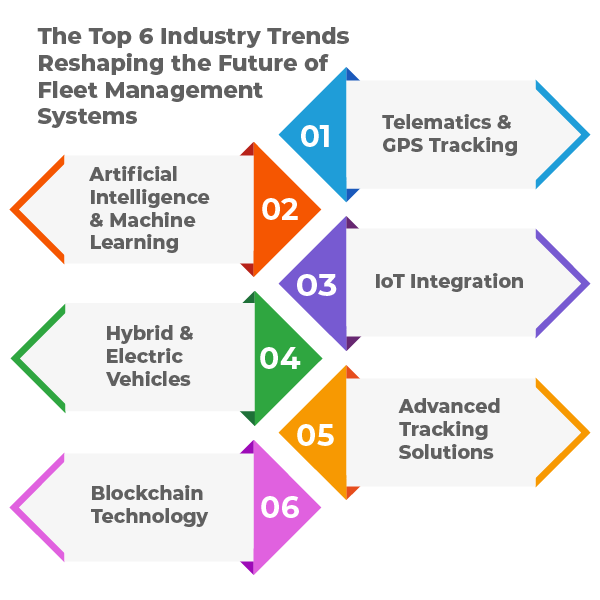The future of fleet management systems relies on the technological revolution that helps to cut costs, increase efficiency and ensure safety. The modern fleet management system with real-time updates, accurate geolocation, and vehicle diagnostics overview identifies unsafe and risky behavior and minimizes work. It also allows such companies to enhance their customer experience and contribute towards a sustainable future.
As technology advances, industry trends and traditional practices evolve. Tracking and following industry trends is crucial to understand how new advancements can contribute to change in the future of fleet management systems.

Recent Advancements in Fleet Management Systems
Fleet management systems are now equipped with sensors, actuators, advanced electronics, network connectivity, and digital operations, allowing companies to monitor real-time vehicle performance and driver behavior to reduce risks and ensure safety. Real-time monitoring and system updates enable the companies to provide optimal solutions to identify hazards and take prompt actions.
Now these systems are being integrated with Artificial Intelligence (AI) and Machine Learning (ML), allowing systems to do predictive analysis, increase fuel efficiency, contribute to sustainability, analyze data, and will enable companies to stay ahead of the competition.
The Top 6 Industry Trends Reshaping the Future of Fleet Management Systems
– Telematics and GPS Tracking
Telematics uses advanced technology to track and monitor vehicles, while GPS tracking allows real-time vehicle location monitoring. We expect telematics and GPS tracking to become more crucial and contribute to fleet optimization. These technological implications enable real-time tracking, guide drivers to adopt the best routes, increase safety and reduce operational costs. These implementations can help to identify patterns, helping fleet managers to make the best possible decisions.
As these technological implementations evolve, fleet routing software integrates with other advanced systems to provide optimal solutions. By collecting and analyzing data in real-time, fleet managers can optimize operations and contribute towards sustainability.
– Artificial Intelligence (AI) and Machine Learning (ML)
Despite the huge application of AI and ML in fleet management, there is huge room for improvement. Recent updates show that AI and ML are used in fleet management and help modernize conventional practices. These implementations help to achieve route optimization and provide real-time updates and predictive maintenance.
With large amounts of Big Data and complex algorithms available, technological implementations will help fleet managers make prompt decisions about predictive risks. In this way, it helps to inhibit issues even before it occurs. While giving feedback to users, these implementations will support the fleet managers to avoid the wrong steps they take. Overall, these implementations will minimize accidents, save fuel, and even help to achieve sustainable goals.
– IoT Integration
IoT integration involves integrating IoT-related data, devices, and applications with IT assets to provide a more connected environment and implement end-to-end IoT solutions. In fleet management, these connected devices provide advanced solutions such as capturing real-time data and transferring data to other devices to provide optimal asset utilization and enhance operation management.
With further improvements, it can automate the maintenance process and alert owners if the vehicle needs service or repairs. The system can also send alerts to nearby hospitals for emergency response. Moreover, IoT can monitor environmental conditions such as humidity level, temperature, and air quality. It allows fleet managers to choose optimal routes and days for transporting sensitive cargo.
– Hybrid and Electric Vehicles
Due to the increased concerns of environmental impact, high inflation, fuel cost, and energy crises, many fleet managers globally have started to opt for hybrid and electric cars. These vehicles are eco-friendly, demand less maintenance cost and fuel consumption and contribute to less carbon emission. However, it is still in the challenging phase due to the high implementation cost of charging infrastructure. As technology continues to grow and the range of batteries increases, the adoption of electric and hybrid vehicles will also increase to meet sustainability goals and fuel crises.
– Advanced Tracking Solutions
Many fleet management companies experience issues of losing their assets, which results in huge losses. As technology advances, the chances of hacking systems and criminal activities are also increasing. All these issues result in the increasing demand for real-time tracking and installation of virtual boundaries on the map to get notifications if their vehicle crosses it.
Different asset-tracking solutions launched recently, such as TrackPro, provide an IoT-enabled, efficient, and secure tracking solution. This system assists fleet managers in tracking and monitoring their assets in real-time. With GPS sensors, TrackPro tracks the real-time locations of cars and highlights the area on a laptop or mobile linked with it. With multiple geofencing, the system can alert nearby police stations and fleet management companies to take strict actions.
In the future, companies can integrate real-time tracking systems with other systems to provide profound solutions. For example, by integrating with Big Data, AI, and cloud computing, real-time tracking systems can predict risks, analyze reports and help fleet managers to make effective decisions.
– Blockchain Technology
The fleet management system contributes towards a high level of planning, managing, coordinating, directing, and supervising the programs for utilization, repair, assignment, disposal, and replacement of fleet vehicles. With data sharing across business networks, it can effectively monitor loads and send verifiable data to drivers and customers. Blockchain via decentralized ledgers enhances transparency for clients and allows them to track the entire journey of their products till it reaches their destination.
The trucking load-matching apps help to identify excess capacity across distribution networks and can effectively coordinate efficient loading, distribution, transportation, and tracking. Moreover, with the help of smart contracts, it allows logistic companies to automate transparency. At present, it is in an initial phase, but progressing fast to play a positive role in the future of fleet management systems.
Conclusion
Fleet management systems manage motor vehicles, such as trucks, cars, and vans, to ensure maintenance, optimal utilization, and fuel consumption. Fleet management companies use smart solutions to manage challenges and meet customer expectations. To ensure positive changes in the upcoming era of fleet management, technological implementations such as blockchain, IoT, AI, and ML will innovate traditional practices. They will help to provide efficient and eco-friendly real-time tracking, geofencing, monitoring, managing, and securing fleet assets.





